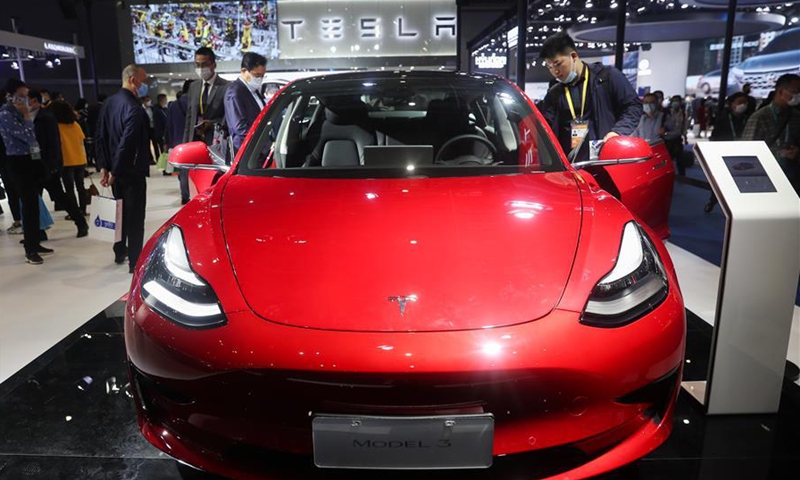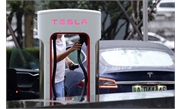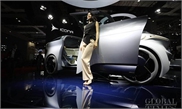
A Tesla Model 3 electric car is seen at the Automobile exhibition area during the third China International Import Expo (CIIE) in Shanghai, east China, Nov. 6, 2020.Photo:Xinhua
Chinese electric vehicle (EV) producers may discover new opportunities for cooperation and expansion in the US market as the Biden administration aims to promote EVs as a means to achieve its ambitious climate goals.
The US is a developed vehicle market that some Chinese auto producers have failed to enter despite many efforts. But although Washington wants to support domestic vehicle manufacturing, Chinese players will keep trying, observers told the Global Times on Thursday.
US President Joe Biden, who has made climate change a priority of his administration, said during a briefing on Monday "the federal government owns an enormous fleet of vehicles, which we're going to replace with clean EVs made right here in America, by American workers," while announcing his "Buy American" executive order.
Biden wants to offer incentives for US consumers to replace fuel cars with EVs, although no details are yet available.
The news lifted Tesla, the US EV giant, General Motors and Ford, which are investing heavily in EVs.
Three Tesla challengers from China - NIO, XPeng and Li Auto - saw their shares rise in the US following Biden's announcement.
NIO told the Global Times on Thursday that "we are a global start-up company, so we look forward to entering more global markets. We have plans to enter the European market this year. We will find a suitable time to announce the specific time schedule and related information."
XPeng started its European rollout in December 2020 by delivering the first 100 units of its G3 crossover to customers in Norway.
Compared with the attractive European market, where EV sales are rising, helped by government subsidies, Chinese EV start-ups have avoided the tough US market.
"But there's an opportunity. The EV sector in the US is still wide open. The EV supply and industry chains are still not mature, and there is room to tap into" the sector, said Cui Dongshu, secretary general of the China Passenger Car Association.
Cui told the Global Times on Thursday that Tesla, with a dominant share in the US EV market, prioritizes luxury and performance cars. But in the vast low- and middle-end segments, products with attractive performance-price ratios could also succeed.
Cui said the opportunities for traditional Chinese automakers like SAIC and GAC to bring their EVs to the US market are relatively higher, due to their cost controls and low prices.
Biden aims to exceed the standards set by former president Barack Obama, which called for a yearly increase in average fleet fuel efficiency of 4.7 percent. To reach that goal, it would mean by 2026, about 25 percent of light-duty passenger vehicles sold in the US would be electricity-driven, analysts said.
In the 22 US states that represent about 65 percent of the EV market in the nation, 130,844 new Tesla vehicles were registered last year, up less than 2 percent from 2019, data showed.
China's NEV sector is leading the world in terms of the establishment of an industry system, the improvement of technology levels and corporate competitiveness, and the construction of infrastructure, said Miao Wei, former minister of industry and information technology.
However, geopolitical risk is still a head-ache for Chinese companies going into the US, according to Zeng Zhiling, managing director of LMC Automotive Consulting in Shanghai.
"It's still too early to believe that the US government will open the window for Chinese players as China did for Tesla," Zeng said. Also, US consumers generally have low awareness of Chinese vehicle brands.



